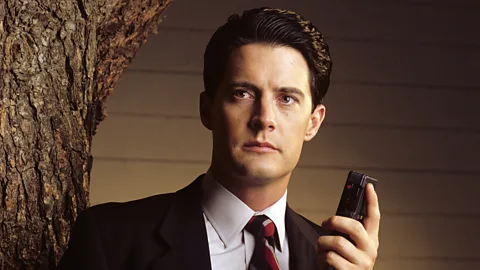Twin Peaks' Agent Cooper: How TV's strangest detective was born
 Getty Images
Getty ImagesIn exclusive archive BBC interviews the creators of the 90s TV series talk about their unique vision – and how the eccentric character at its centre, Special Agent Dale Cooper, was based on the director David Lynch's own personality.
On 8 April 1990, Twin Peaks viewers were introduced to the brilliant but eccentric FBI Special Agent Dale Cooper, played by Kyle MacLachlan, who went on to win an Emmy for his performance.
With his unfailing courtesy, unconventional but formidable investigative methods, obsessive love of cherry pie and "damn fine" coffee, and his habit of recording dictaphone messages to his unseen secretary, Diane, Agent Cooper quickly became one the decade's most beloved TV detectives.
Writer Mark Frost told the BBC's Late Show that part of the inspiration behind the character was the show's co-creator and director David Lynch.
"I tried to base that character on David to some extent," said Frost. "A lot of his quirkiness and attention to detail, which are things that David has in great abundance, sort of came to the surface with that character. I guess his interest in people's obsessions, and characters who are obsessed with something, are pretty common with other things he's done."
Eerie, cinematic and often confusing, Twin Peaks was unlike anything else on TV at the time. Set in the picturesque town of the show's title, it followed Agent Dale Cooper as he tried to help local police investigate the murder of high school student Laura Palmer, played by Sheryl Lee. As Cooper looks for the killer, the town's dark underbelly is slowly uncovered to reveal criminality, deeply buried trauma and supernatural phenomena.
Frost had previously been a writer for the NBC TV series Hill Street Blues. That show, with its ensemble cast, fast-moving handheld camera work and interweaving storylines about the believably overworked police of an inner-city precinct, proved groundbreaking when it was first broadcast. Frost and Lynch wanted to do something equally complex with Twin Peaks, subverting viewers' expectations.
"As Hill Street [Blues] had kind of turned the idea of the cop show on its head at the beginning of the decade, we had the chance to do something like that with Twin Peaks. I think the conventions of the genre had grown rather stale in the last few years, and that the shows that had been the staples of that genre had grown rather tired. And there might be a way to infuse some fresh ideas and some fresh approach to the night-time soap – and that's how Twin Peaks kind of came to life," said Frost.
Lynch, who was then well-known as a film director, saw the possibilities in long-form storytelling. "The beautiful thing about television is you have the chance to do a continuing story and that is pretty neat to me," Lynch told the BBC's Late Show. "That's the main reason for doing it, the idea that you can experience this world and get to know these characters and weave these problems over the weeks.
The show defied easy categorisation, part police procedural, part mystery melodrama, with elements of horror, surrealism, and comedy thrown in. Lynch as the director brought a striking visual aesthetic, infusing the show with a dreamlike quality, helped along by the atmospheric theme music by Angelo Badalamenti.
Outlandish and unconventional
Like protagonist Cooper, Lynch was unconventional. The show would often flip from the mundane to downright outlandish within a single scene, with character archetypes, such as the troubled biker youth or the corrupt businessman, turning out to be much more strange, and ambiguous, than expected.
More like this:
Lynch's tendency to stay with shots longer than the viewer would expect imbued scenes set in familiar small-town American settings, such as the diner, the high school or suburban home, with a palpable sense of unease.
In History
In History is a series which uses the BBC's unique audio and video archive to explore historical events that still resonate today. Subscribe to the accompanying weekly newsletter.
"One of the things that really signal in David's work" said Frost, "is his ability to get past the narrative convention of storytelling. Very frequently in film and television, people will use an emotion not to convey an emotion but to convey a plot point or a story point. They'll say there's grief, we understand that, let's move on, and what David is really superb at is staying with that emotion and letting it become as real as possible, and many people find that very uncomfortable. That's why, to me, David's style is actually very real and very realistic."
Despite initially running for just two seasons before it was cancelled, Twin Peaks was hugely influential on the TV shows that followed it. Echoes of its surreal nature, alternate realities, idiosyncratic characters and use of dream sequences can be seen in everything from The X-Files, Lost and Fargo to The OA, The Leftovers and The Sopranos.
It inspired a legion of devoted fans, whose loyalty would see it return first as a film, Twin Peaks: Fire Walk With Me in 1992, and then for a third series in 2017 to capitalise on its popularity.
And at the heart of it lies Agent Dale Cooper, with all his enthusiasms and eccentricities, a reflection of David Lynch himself.
As Kyle MacLachlan told the Guardian in 2020: "I added a lot of David's traits in playing him, whether that was vocalisations or particular phrases David says. Really, Dale Cooper is David, not me."
--
In History is a series which uses the BBC's unique audio and video archive to explore historical events that still resonate today. Subscribe to the In History newsletter to discover more stories and never-before-published radio scripts to your inbox, every Thursday.
